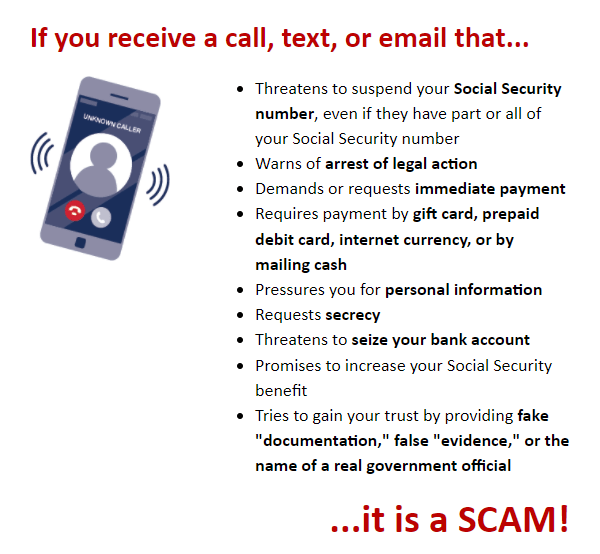In today’s world there are many ways in which seniors and those most vulnerable in our society are scammed or cheated out of their money and benefits. This has unfortunately become even easier as time goes on thanks to the ever increasing sophistication of technology that can enable these scams to be conducted far outside the jurisdiction of US authorities. Typically these scams take place in the form of a call, text message, email or another form of electronic communication.
The most common and insidious of these scams are the ones involving an individual’s Social Security. In these situations, the purpose of the scam is to gain access to an individual’s social security number (SSN), or to falsify a story surrounding their social security benefits in order to extract payment in the form of a fee, or sometimes both. For individuals who are elderly or potentially not completely mentally aware, they are easily taken advantage of by these scammers who often use scare tactics to get their victims to go along with their requests or agenda.
Warning Signs
Luckily there are some clear warning signs to look out for in the event a social security scammer reaches out. Generally speaking, these scammers will use the following tactics to convince an individual to give up their information or pay a fee:
- Claim that their SSN was suspended
- Claim that their SSN was compromised and offer to issue a new number for a fee
- Threaten consequences such as arrest, loss of benefits or the suspension of an individual’s SSN if they do not make an immediate payment by electronic means such as gift cars, prepaid debit cards, wire transfers or cryptocurrency.
- Contact you to inform of an increase in benefits, asking to verify certain personally identifiable information such as name, date of birth and social security number in order to receive this extra money.

What to Do When Receiving These Calls
When you know what to look for, these scams are pretty easy to spot. It should be noted that the Social Security Administration will never suspend a SSN, randomly reach out to confirm information, to assist in providing a new social security number, or ask for personal information as a condition of a benefit increase. When you receive these calls, it is important to note that you do not need to say anything – you can simply hang up. It is absolutely vital that you do not agree to anything or provide any information to the scammer, as they can use this to potentially reroute benefits to themselves or use your SSN as a skeleton key to steal your identity.
If you or a loved one has fallen victim to one of these scams, it is absolutely vital that you contact an elder law attorney as soon as possible in order to protect your identity and social security benefits. Unfortunately, there is little legal recourse possible since most of these crimes are conducted outside the country and the perpetrators therefore would not be facing charges for federal crimes, such as fraud and the impersonation of a government official. However, an attorney specializing in elder law will be able to assist you in sorting out the situation with the Social Security Administration and give sound advice as to the best course of action to make things right.
